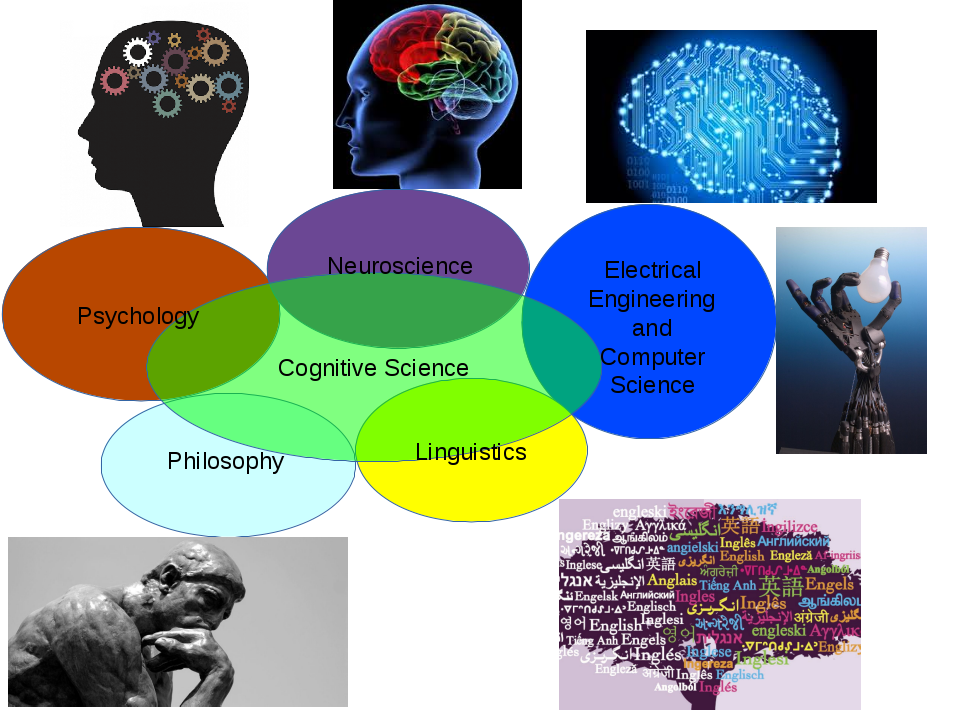[Teaching home]
ELL457: Special Topics in Cognitive and Intelligent Systems
HUL381: Mind, Machines and Language

If you are doing the course, please join the Piazza forum (the access code has been announced in class and e-mailed to you).
This is a course at the interface of two areas which have seen many exciting developments in recent years: Cognitive Science and Artificial Intelligence (AI). The common scientific core of these areas can be seen as the enterprise of modelling, emulating, and understanding the cognitive capacity of the human mind; what we also commonly refer to as intelligence. What are the powers and limits of the mind? How does it represent and process information about the external world? How does it produce decisions and actions? Is the mind a computing machine? Can machines think? What does it mean to 'think'? Is cognition merely symbol manipulation, or something more? How do mental processes like attention, perception, learning, and memory work? Do advances in areas like machine learning give us some clues as to how the mind acquires knowledge? How does the history of attempts to reproduce human intelligence in machines (AI), and the many debates and controversies that have surrounded these, enhance our possbility of being able to formally model mental cognition? How does our knowledge of language, arguably the most uniquely human form of intelligence, help us to understand the ways in which our cognitive systems are especially evolved and adapted to enable this form of communication? Can we think of our minds just as abstract information-processors, or does their working also depend on the physical bodies they sit in? Can human cognition exist independent of the human body?
As an introductory course, this will be broad in scope. We will cover some of the classic philosophical debates around the relation between mind and machine, which continue to resonate in both academic and popular culture today, such as Alan Turing's 'Imitation Game' or 'Turing Test' and John Searle's 'Chinese Room Problem'. We will talk about how evolutionary psychology can throw light on our minds and how they relate to those of other animals. We will talk of different formal notions of computation and information-processing: classical or symbolic, connectionist or neural networks, Bayesian, dynamical systems. We will try to understand what aspects of human cognition, in language and other domains, such computational models can and cannot capture. We will go over the history of AI, the debates around 'strong' and 'weak' AI, and how they have influenced our thinking about the nature of our own minds. And, last but not least, we will also briefly explore the relation between mind and body, and the exciting emerging area of embodied cognition, looking at examples such as metaphors to illustrate how our bodies and their spatial relations to the physical world around us may be an indispensable aspect of how we think.
Instructors: Sumeet Agarwal and Sumitava Mukherjee
TAs: Jatin Sharma and Sidharth Ranjan
3 credits (3-0-0)
II Semester 2018–19
M Th 17:00–18:20, LH 613
Evaluation components
References
- Jay Friedenberg and Gordon Silverman. Cognitive Science: An Introduction to the Study of Mind. SAGE Publications, 2006.
- José Luis Bermúdez. Cognitive Science: An Introduction to the Science of the Mind. Cambridge, 2010.
- Zenon W. Pylyshyn. Computation and Cognition: Toward a Foundation for Cognitive Science. MIT, 1984.
- Stan Franklin. Artificial Minds. MIT, 1995.
- Turing, Alan M. Computing Machinery and Intelligence. Mind LIX(236): 433–460 (1950) [doi:10.1093/mind/LIX.236.433] [pdf] [sqapo].
- Searle, John R. Minds, Brains, and Programs. Behavioral and Brain Sciences 3: 417–424 (1980) [doi:10.1017/S0140525X00005756] [pdf].
- Pinker, Steven. How the Mind Works. Penguin, 1999.
- Fodor, Jerry. The Mind Doesn't Work That Way: The Scope and Limits of Computational Psychology. MIT, 2000.
- Thomas L. Griffiths, Charles Kemp, and Joshua B. Tenenbaum. Bayesian models of cognition. In Ron Sun (ed.), The Cambridge handbook of computational cognitive modeling (2008) [pdf].
- George Lakoff and Mark Johnson. Metaphors We Live By. Chicago, 1980.
Planned schedule
| Serial no. |
Lecture nos. |
Topics |
Instructor |
| 1 |
1 |
Introduction; the initial ideas of minds and machines |
SM, SA |
| 2 |
2 |
Symbols, syntax, and semantics |
SM |
| 3 |
3–4 |
The mind-body problem; functionalism |
SM |
| 4 |
5 |
Guest lecture: Learning to See Late in Childhood |
Pawan Sinha |
| 5 |
6–8 |
The computational approach: automata, parallel and connectionist approaches |
SA, SM |
| 6 |
8–9 |
Nature of intelligence; animal and human minds; evolutionary psychology |
SM |
| 7 |
10 |
The cognitive revolution: bringing minds and machines closer |
SM |
| 8 |
11–15; 18–19 |
Artificial intelligence and thinking machines; foundational debates (Turing's Imitation Game, Searle's Chinese Room) |
SM, SA |
| 9 |
16–17; 20–21; 23–27 |
Computational theories and models of mind: classical models, connectionist and deep learning models, Bayesian models, dynamical systems |
SA |
| 10 |
22 |
Guest lecture: Language as a window on the mind |
Rajakrishnan Rajkumar |
| 11 |
27–28 |
Embodied cognition and Metaphor |
SA, SM |
[Image credits: directactioneverywhere.com; mcgill.ca; edx.org; wikipedia.org; nu.ac.th; binghamton.edu.]
[Teaching home]
